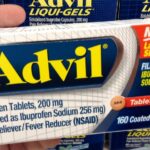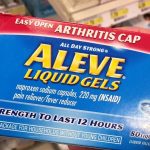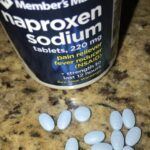What is the Active Ingredient in Aleve?
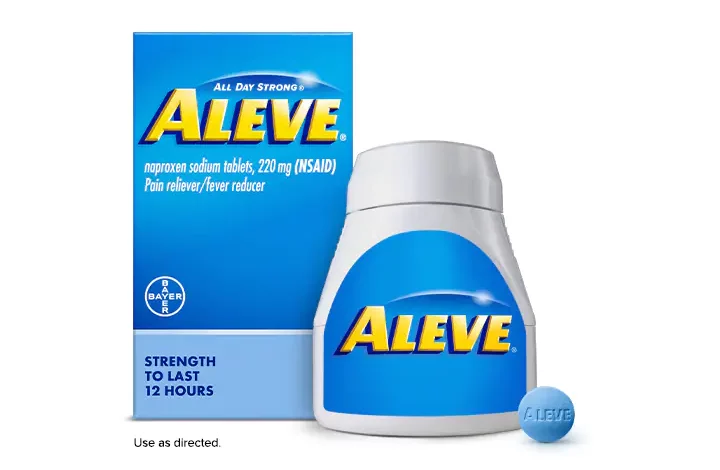
Active ingredients are the ingredients in a drug that is biologically active. It’s important to know as much as you can about medications and to be informed about what you’re taking from the way a medication interacts with others to the potential side effects it causes.
For example, some medicines may interact badly with certain foods, other medications, or even food supplements, and can make you very ill. Always do all you can to get and stay healthier by understanding as much as you can about your medications.
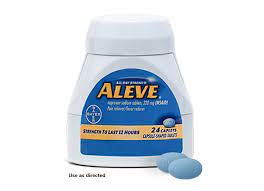
What is the Active Ingredient in Aleve?
The active pharmaceutical ingredient in Aleve is naproxen, a nonsteroidal anti-inflammatory drug (NSAID). Naproxen works by reducing hormones that cause inflammation and pain in the body. Aleve is used to temporarily relieve minor aches and pains due to arthritis, muscular aches, backache, menstrual cramps, headache, toothache and the common cold. Aleve is also used to temporarily reduce fever.
Naproxen was first released to the prescription drug market in 1976 under the name Naprosyn. In 1980, its counterpart salt, naproxen sodium was released for prescription use only under the name Anaprox. In June of 1994, the FDA approved naproxen’s use for an over-the-counter drug in low doses, this new drug was advertised as Aleve and marketed by Bayer HealthCare. Aleve may also be used for purposes not listed in this medication guide.
What side effects can the active ingredient in Aleve cause?
Aleve may cause side effects. Tell your doctor if any of these symptoms are severe or do not go away:
- constipation
- diarrhea
- gas
- excessive thirst
- headache
- dizziness
- lightheadedness
- drowsiness
- difficulty falling asleep or staying asleep
- burning or tingling in the arms or legs
- cold symptoms
- ringing in the ears
- hearing problems
Some side effects can be serious. If you experience any of the following symptoms, call your doctor immediately. Do not take any more naproxen until you speak to your doctor:
- changes in vision
- feeling that the tablet is stuck in your throat
- unexplained weight gain
- shortness of breath or difficulty breathing
- swelling in the abdomen, ankles, feet, or legs
- sore throat, fever, chills, and other signs of infection
- blisters
- rash
- skin reddening
- itching
- hives
- swelling of the eyes, face, lips, tongue, throat, arms, or hands
- difficulty breathing or swallowing
- hoarseness
- excessive tiredness
- pain in the upper right part of the stomach
- nausea
- yellowing of the skin or eyes
- flu-like symptoms
- bruises or purple blotches under the skin
- fast heartbeat
- cloudy, discolored, or bloody urine
- back pain
- difficult or painful urination
- decreased urination
- loss of appetite
- confusion
Naproxen may cause other side effects. Call your doctor if you have any unusual problems while taking this medication.
Aleve Safety Information
People who take nonsteroidal anti-inflammatory drugs (NSAIDs) (other than aspirin) such as Aleve may have a higher risk of having a heart attack or a stroke than people who do not take these medications. These events may happen without warning and may cause death. This risk may be higher for people who take NSAIDs for a long time. Do not take an NSAID such as naproxen if you have recently had a heart attack, unless directed to do so by your doctor. Tell your doctor if you or anyone in your family has or has ever had heart disease, a heart attack, or a stroke, if you smoke, and if you have or have ever had high cholesterol, high blood pressure, or diabetes. Get emergency medical help right away if you experience any of the following symptoms: chest pain, shortness of breath, weakness in one part or side of the body, or slurred speech.
If you will be undergoing a coronary artery bypass graft (CABG; a type of heart surgery), you should not take naproxen right before or right after the surgery.
NSAIDs such as naproxen may cause ulcers, bleeding, or holes in the stomach or intestine. These problems may develop at any time during treatment, may happen without warning symptoms, and may cause death. The risk may be higher for people who take NSAIDs for a long time, are older in age, have poor health, or who drink three or more alcoholic drinks per day while taking naproxen. Tell your doctor if you take any of the following medications: anticoagulants (”blood thinners”) such as warfarin (Coumadin, Jantoven); aspirin; other NSAIDs such as ibuprofen (Advil, Motrin) and ketoprofen; oral steroids such as dexamethasone, methylprednisolone (Medrol), and prednisone (Rayos); selective serotonin reuptake inhibitors (SSRIs) such as citalopram (Celexa), fluoxetine (Prozac, Sarafem, Selfemra, in Symbyax), fluvoxamine (Luvox), paroxetine (Brisdelle, Paxil, Pexeva), and sertraline (Zoloft); or serotonin norepinephrine reuptake inhibitors (SNRIs) such as desvenlafaxine (Khedezla, Pristiq), duloxetine (Cymbalta), and venlafaxine (Effexor XR). Also tell your doctor if you have or have ever had ulcers, bleeding in your stomach or intestines, or other bleeding disorders. If you experience any of the following symptoms, stop taking naproxen and call your doctor: stomach pain, heartburn, vomit that is bloody or looks like coffee grounds, blood in the stool, or black and tarry stools.
Keep all appointments with your doctor and the laboratory. Your doctor will monitor your symptoms carefully and will probably order certain tests to check your body’s response to naproxen. Be sure to tell your doctor how you are feeling so that your doctor can prescribe the right amount of medication to treat your condition with the lowest risk of serious side effects.

